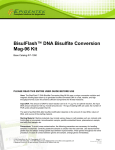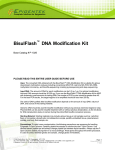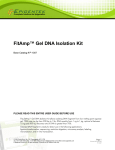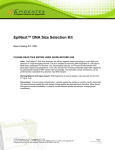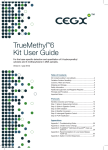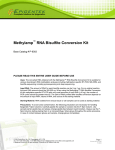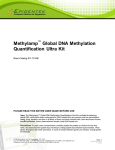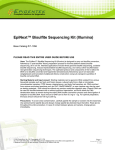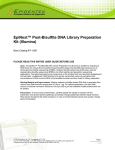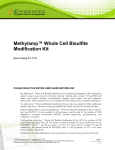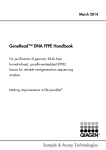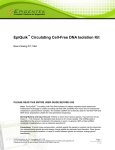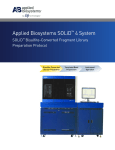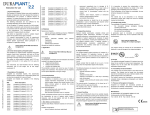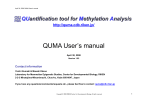Download BisulFlash™ DNA Bisulfite Conversion Easy Kit
Transcript
EPIGENTEK Complete Solutions for Epigeneti cs BisulFlash™ DNA Bisulfite Conversion Easy Kit Base Catalog # P-1054 PLEASE READ THIS ENTIRE USER GUIDE BEFORE USE Uses: The BisulFlash™ DNA Bisulfite Conversion Easy Kit uses a unique conversion solution and column-based clean-up to generate bisulfite-converted DNA in a fast, reliable, and convenient format. Each kit contains sufficient components for 50 total reactions. High yield, converted DNA can be obtained and used for various downstream applications including PCR, array, and next generation sequencing after post-bisulfite adaptor ligation. Input DNA: The amount of DNA for each reaction can be 0.1-1 µg. For an optimal reaction, the input DNA amount should be 100 ng. If small amounts (i.e., <10 ng) of starting DNA are used, the number of PCR cycles should be greater than 45. The yield of purified DNA after bisulfite modification depends on the amount of input DNA, nature of DNA, and source of the starting material. Starting Material: Starting materials may include various tissue or cell samples such as: cultured cells from a flask or microplate, microdissection sample, paraffin-embedded tissue, plasma/serum sample, and body fluid sample, etc. Precautions: To avoid cross-contamination, the following precautions are necessary for handling samples in tube/vials: Carefully pipette the sample or solution into the tube/vials. Use aerosol-barrier pipette tips and always change pipette tips between liquid transfers. Wear gloves throughout the entire procedure. In case of contact between gloves and sample, change gloves immediately. P-1054110 Bi County Blvd. Ste. 122, Farmingdale, NY 11735 Tel: 1-877-374-4368 ■ Fax: 1-718-484-3956 ■ E-mail: [email protected] ■ Web: www.epigentek.com © Epigentek Group Inc. All rights reserved. Products are for research use only. Page 1 Printed 2015-11-16 P-1054 EPIGENTEK Complete Solutions for Epigeneti cs KIT CONTENTS Component 50 Reactions Cat # P-1054-050 Storage Upon Receipt BisulFlash Conversion Mix 8 ml RT DNA Binding Solution 20 ml RT Desulfonation Buffer 0.5 ml RT Elution Buffer 2 ml RT Spin Column* 50 RT Collection Tube 50 RT User Guide 1 RT * Always cap spin columns b efore placing them in the microcentrifuge. SHIPPING & STORAGE The kit is shipped at ambient room temperature. Upon receipt: Store all components at room temperature (15-22°C) away from light. All components of the kit are stable for up to 6 months from the date of shipment, when stored properly. MATERIALS REQUIRED BUT NOT SUPPLIED Thermal cycler with heated lid* *Since the bisulfite reaction is not overlaid with mineral oil, only thermal cyclers with heated lids are suitable for this procedure. Pipette and pipette tips 0.2 ml PCR tubes or PCR plate 1.5 ml microcentrifuge tubes 90% ethanol GENERAL PRODUCT INFORMATION Quality Control: Each lot of the BisulFlash™ DNA Bisulfite Conversion Easy Kit is tested against predetermined specifications to ensure consistent product quality. Epigentek guarantees the performance of all products in the manner described in our product instructions. P-1054110 Bi County Blvd. Ste. 122, Farmingdale, NY 11735 Tel: 1-877-374-4368 ■ Fax: 1-718-484-3956 ■ E-mail: [email protected] ■ Web: www.epigentek.com © Epigentek Group Inc. All rights reserved. Products are for research use only. Page 2 Printed 2015-11-16 P-1054 EPIGENTEK Complete Solutions for Epigeneti cs Product Warranty: If this product does not meet your expectations, simply call our technical support unit or your regional distributor. We also encourage you to contact us if you have any suggestions about product performance or new applications and techniques. Safety: Suitable lab coat, disposable gloves, and proper eye protection are required when working with this product. Product Updates: Epigentek reserves the right to change or modify any product to enhance its performance and design. Usage Limitation: The BisulFlash™ DNA Bisulfite Conversion Easy Kit is for research use only and is not intended for diagnostic or therapeutic application. Intellectual Property: The BisulFlash™ DNA Bisulfite Conversion Easy Kit and methods of use contain proprietary technologies by Epigentek. A BRIEF OVERVIEW DNA methylation occurs by the covalent addition of a methyl group (CH3) at the 5-carbon of the cytosine ring, resulting in 5-methylcytosine (5-mC). DNA methylation is essential in regulating gene expression in nearly all biological processes including development, growth, and differentiation. Aberrant DNA methylation is associated with pathogenesis of diseases such as cancer, autoimmune disorders, and schizophrenia. Thus, gene/region-specific or genome-wide analysis of DNA methylation or 5-methylcytosine (5-mC) could provide valuable information for discovering epigenetic markers used for disease diagnosis, and potential targets used for therapeutics. Bisulfite modification of genomic DNA followed by PCR amplification, cloning-sequencing or whole-genome sequencing is currently considered to be the most reliable method in assessing the methylation states of individual cytosine on individual DNA molecules. By treating DNA with bisulfite, cytosine residues are deaminated to uracil while leaving 5-methylcytosine intact: Epigentek developed the BisulFlash™ DNA Modification Kit (Cat. No. P-1026) to improve DNA bisulfite treatment for faster DNA methylation analysis. Epigentek continues to innovate with the development of the BisulFlash™ DNA Bisulfite Conversion Easy Kit. With novel procedures and optimized P-1054110 Bi County Blvd. Ste. 122, Farmingdale, NY 11735 Tel: 1-877-374-4368 ■ Fax: 1-718-484-3956 ■ E-mail: [email protected] ■ Web: www.epigentek.com © Epigentek Group Inc. All rights reserved. Products are for research use only. Page 3 Printed 2015-11-16 P-1054 EPIGENTEK Complete Solutions for Epigeneti cs components, the kit allows for the preparation of bisulfite converted DNA within 1 hour by simply adding a ready-to-use liquid conversion mix to the DNA samples directly, without need for prepreparation of the conversion reagent. The kit also has the following advantages and features: Fast Procedure – The entire process can be completed within 1 hour. Streamlined - Concurrently processes the DNA denaturation and C to T conversion steps without the need for a separate DNA denaturation step. Complete Conversion - Completely converts unmethylated cytosine into uracil (>99.9%) with negligible inappropriate or erroneous conversion of methylcytosine to thymine (<0.1%). Robust - Simple, reliable, and consistent reaction conditions with an easy-to-follow protocol and high yield. PRINCIPLE & PROCEDURE The BisulFlash™ DNA Bisulfite Conversion Easy Kit contains all reagents required for a fast bisulfite conversion in a high throughput format. With the unique conversion mix solution, DNA denaturation status is sustained throughout the entire bisulfite conversion process, thereby enabling 100% of unmethylated cytosine to be converted to uracil. Desulfonation and clean-up of the converted DNA is performed using DNA purification columns. High yield, converted DNA can be obtained and used for various downstream applications including PCR, array, and next generation sequencing. A B Fig 1. Schematic procedure of the BisulFlash™ DNA Bisulfite Conversion Easy Kit. Fig 2. Different amounts of HeLa DNA w ere converted using the BisulFlash™ DNA Bisulfite Conversion Easy Kit. A) Real-time PCR Ct value curve for different amounts of input DNA performed using primers designed for both methylated and unmethylated alleles of β-actin. B) Ct values for different gene targets of a converted DNA sample. Internal control β-actin Ct value is also shown. All converted DNA w as amplified using the Methylamp™ MS-qPCR Fast Kit (Cat. No. P-1028). P-1054110 Bi County Blvd. Ste. 122, Farmingdale, NY 11735 Tel: 1-877-374-4368 ■ Fax: 1-718-484-3956 ■ E-mail: [email protected] ■ Web: www.epigentek.com © Epigentek Group Inc. All rights reserved. Products are for research use only. Page 4 Printed 2015-11-16 P-1054 EPIGENTEK Complete Solutions for Epigeneti cs ASSAY PROTOCOL For the best results, please read the protocol in its entirety prior to starting your experiment. Starting Materials Input DNA Amount: Optimal DNA amount is 100 ng per reaction. Starting DNA may be in water or in a buffer such as TE. DNA Isolation: You can use your method of choice for DNA isolation. Epigentek offers a series of genomic DNA isolation kits for your convenience. DNA Storage: Isolated genomic DNA can be stored at 4°C or -20°C until use. Bisulfite DNA Conversion 1. For each well of a PCR plate or 0.2 ml PCR tube, add 150 μl of the BisulFlash Conversion Mix solution, followed by adding 2-15 μl of your DNA sample (optimal 100 ng). 2. Tightly close the PCR well/tubes and place them in a thermal cycler with heated lid. Program and run the thermal cycler at 80°C for 45 min. Converted DNA Clean-Up 1. Place a Spin Column into a 2 ml Collection Tube. Add 300 µl of DNA Binding Solution to each Spin Column. Then transfer the samples from each PCR tube (from Step 2 of Bisulfite DNA Conversion) to the Spin Column. Centrifuge at 12,000 rpm for 30 sec. Remove Spin Columns from Collection Tubes and discard the flowthrough. Place Spin Columns back into Collection Tubes. 2. Add 200 µl of 90% ethanol solution to each Spin Column. Centrifuge at 12,000 rpm for 30 sec. 3. Prepare final desulfonation buffer by adding 25 µl of Desulfonation Buffer to every 1 ml of 90% ethanol, and mix. Add 150 µl of the final desulfonation buffer to each column. Allow Spin Columns to sit for 10 min at room temperature, then centrifuge at 12,000 rpm for 30 sec. Remove Spin Columns from Collection Tubes and discard the flowthrough. Place Spin Columns back into Collection Tubes. 4. Add 200 µl of 90% ethanol to each Spin Column. Centrifuge at 12,000 rpm for 30 sec. Remove Spin Columns from Collection Tubes and discard the flowthrough. Place Spin Columns back into Collection Tubes. Add 200 µl of 90% ethanol to each Spin Column again and centrifuge at 12,000 rpm for 45 sec. 5. Insert each column into a new 1.5 ml tube. Add 10-20 µl of Elution Buffer directly to each Spin Column’s filter membrane. Centrifuge at 12,000 rpm for 30 sec to elute converted DNA. Modified DNA is now ready for use or storage at or below -20°C for up to 6 months. We recommend using 1–2 μl of the DNA for each real-time qPCR reaction and 2-4 μl for each end-point PCR reaction. Methylation-specific real-time PCR can be performed by using your own successful method. For your convenience and the best results, Epigentek offers the Methylamp™ MS-qPCR Fast Kit (Cat. No. P1028) that is optimized for fast methylation specific qPCR reactions in 70 minutes (see “Work ing with Methylation Specific qPCR”). P-1054110 Bi County Blvd. Ste. 122, Farmingdale, NY 11735 Tel: 1-877-374-4368 ■ Fax: 1-718-484-3956 ■ E-mail: [email protected] ■ Web: www.epigentek.com © Epigentek Group Inc. All rights reserved. Products are for research use only. Page 5 Printed 2015-11-16 P-1054 EPIGENTEK Complete Solutions for Epigeneti cs WORKING WITH METHYLATION SPECIFIC qPCR Working with MS-qPCR not only allows detection of gene-specific methylation, it also validates if the DNA is efficiently converted. For MS-qPCR, we recommend using the Methylamp™ MS-qPCR Fast Kit (Cat. No. P-1028) which has been optimized to decrease the overall methylation specific-qPCR amplification time and include primers specific for converted DNA. The master mix is provided at 2X concentration for easier preparation of PCR reactions requiring only the addition of primers and templates. With this kit, the MS-qPCR can be finished in as short as 70 min. Prepare the PCR Reactions Component Size (µl) Final Concentration Methylamp Master Mix (2X) Forward Primer Reverse Primer DNA Template DNA/RNA-free H2O Total Volume 10 µl 1 µl 1 µl 1-2 µl 6-7 µl 20 µl 1X 0.4-0.5 µM 0.4-0.5 µM 50 pg-0.1 µg For the negative control, use DNA/RNA-free water instead of DNA template. Program the PCR Reactions Cycle Step Activation Cycling Final Extension Temp 95°C 95°C 55°C 72°C 72°C Time 7 min 10 sec 10 sec 8 sec 1 min Cycle 1 40-45 1 TROUBLESHOOTING Problem Possible Causes Suggestions DNA is Poorly Modified Poor DNA quality (DNA is severely degraded). Check if the sample DNA 260/280 ratio is between 1.6-1.9, and if DNA is degraded by running a gel. Too little DNA or too much DNA (i.e., <100 pg or >1 µg). Increase or decrease input DNA to within the correct range, or to the optimal amount of 100 ng. Temperature or thermal cycling condition is incorrect. Check for appropriate temperature or thermal cycling conditions. P-1054110 Bi County Blvd. Ste. 122, Farmingdale, NY 11735 Tel: 1-877-374-4368 ■ Fax: 1-718-484-3956 ■ E-mail: [email protected] ■ Web: www.epigentek.com © Epigentek Group Inc. All rights reserved. Products are for research use only. Page 6 Printed 2015-11-16 P-1054 EPIGENTEK Complete Solutions for Epigeneti cs Eluate Contains Little or No DNA Poor Results in Downstream Methylation-Specific PCR BisulFlash Conversion Mix solution was contaminated by other chemicals or affected by long-term exposure to air. Check if BisulFlash Conversion Mix solution has any color change (deep yellow or brown) or insoluble precipitates. If so, use/order new BisulFlash Conversion Mix solution. Kit is not stored or handled properly. Store all components of the kit at room temperature. Tightly cap the BisulFlash Conversion Mix solution after each opening or use. Poor input DNA quality (degraded). Check if DNA is degraded by running a gel. DNA Binding Solution is not sufficiently added into the sample. Ensure that DNA Binding Solution is added in Step 1 of Converted DNA Clean-Up. Concentration of ethanol solution used for DNA clean-up is not correct. Use 90% ethanol for DNA clean-up. Little or no PCR product even in positive control. Ensure that all PCR components were added and that a suitable PCR program is used (PCR cycles should be >40). PCR primers and probes were not appropriate or were incorrectly designed. Ensure the primer and probes are suitable for MS-PCR. Ensure the amount of template DNA used for PCR was sufficient. Insufficient DNA clean-up. Ensure that 25 µl of Desulfonation Buffer is added into every 1 ml of 90% ethanol at Step 3 of Converted DNA Clean-Up. Significant non-specific PCR products. Failed bisulfite conversion. Ensure that all steps of the modification and cleanup protocol were followed and that the input DNA amount is within the recommended range. Primers and probes are not specific for converted DNA and target genes. Check the primer and probe design. RELATED PRODUCTS DNA Sample Preparation P-1003 FitAmp™ General Tissue Section DNA Isolation Kit P-1004 FitAmp™ Plasma/Serum DNA Isolation Kit P-1054110 Bi County Blvd. Ste. 122, Farmingdale, NY 11735 Tel: 1-877-374-4368 ■ Fax: 1-718-484-3956 ■ E-mail: [email protected] ■ Web: www.epigentek.com © Epigentek Group Inc. All rights reserved. Products are for research use only. Page 7 Printed 2015-11-16 P-1054 EPIGENTEK Complete Solutions for Epigeneti cs P-1006 P-1007 P-1009 P-1017 P-1018 DNA Concentrator Kit FitAmp™ Gel DNA Isolation Kit FitAmp™ Paraffin Tissue Section DNA Isolation Kit FitAmp™ Urine DNA Isolation Kit FitAmp™ Blood and Cultured Cell DNA Extraction Kit DNA Bisulfite Modification P-1001 Methylamp™ DNA Modification Kit P-1016 Methylamp™ Whole Cell Bisulfite Modification Kit P-1026 BisulFlash™ DNA Modification Kit DNA Methylation Analysis P-1005 TuMinute™ PCR Clean-Up Kit P-1011 Methylamp™ Universal Methylated DNA Kit P-1019 Methylamp™ Universal Methylated DNA Preparation Kit P-1028 Methylamp™ MS-qPCR Fast Kit Magnetic Devices Q10002 EpiMag™ HT (96-Well) Magnetic Separator P-1054110 Bi County Blvd. Ste. 122, Farmingdale, NY 11735 Tel: 1-877-374-4368 ■ Fax: 1-718-484-3956 ■ E-mail: [email protected] ■ Web: www.epigentek.com © Epigentek Group Inc. All rights reserved. Products are for research use only. Page 8 Printed 2015-11-16 P-1054








